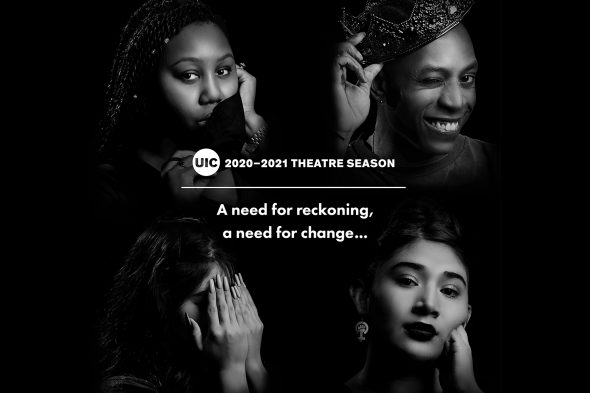2020-2021 UIC Theatre season offers free shows to the public

As COVID-19 continues to shutter theaters around the world, the University of Illinois Chicago’s School of Theatre and Music is kicking off its 2020-2021 Mainstage Theatre season with original looks at our troubled times and contemporary perspectives of historic movements, loss and courage that serve as guideposts for the world we live in today.

The season is dedicated to the memory of William “Bill” Raffeld, associate professor emeritus and UIC alumnus, in honor of his 57 years of teaching and dedication to UIC performing arts. All fall shows are being planned as virtual productions and are free. No decisions have been made yet on whether the spring shows will be presented virtually.
Lydia Diamond, UIC clinical associate professor of theatre in the College of Architecture, Design, and the Arts, who was the recipient of the 2020 Horton Foote Playwriting Award, was the co-creator of the first play, “Reverb,” which looks at the summer of 2020. She has nine published plays, including her latest work, “Toni Stone,” which was critically acclaimed and named Critic’s Pick by the New York Times.

“Reverb” by Karla Corona, Alex Hohnsen, MarieAnge Louis-Jean, Khameron Riley and Phia Ringo kicks off the season. The play — which is directed by Jessica Fisch, UIC adjunct lecturer and freelance director, and co-created with Diamond — looks at the chaotic summer of 2020. A group of recent UIC alumni writers turn their attention to the pandemic, the Black Lives Matters protests and struggles for justice to inspire, entertain and teach as the promise of change hovers in the air. The play opens Oct. 2 and ends Oct. 11. Tickets are available here.

William Shakespeare’s comedy “Love’s Labour’s Lost,” directed by Richard Corley, UIC adjunct lecturer, director, playwright and producer, is the theater season’s second play. One of Shakespeare’s early comedies, it was performed for Queen Elizabeth I of England. The play follows the King of Navarre and his three companions as they attempt to swear off the company of women for three years in order to focus on study and fasting. Their subsequent infatuation with the visiting Princess of France and her ladies makes them forsworn. The play draws on themes of love and desire, reckoning and rationalization, and reality versus fantasy. The play runs from Nov. 13 to Nov. 22. Tickets are available here.

The third play in the season is “The Crucible,” Arthur Miller’s allegorical look at 1950s McCarthyism through the lens of the 17th century Salem witch trials. While the play was written in 1953, its themes are as relevant today in the polarized world of fake news and cancel culture. When teenage girls are discovered trying to conjure spirits, the 17th-century town of Salem explodes with accusations of witchcraft. The vicious trials that follow expose a community paralyzed by fear, religious extremism and greed. The play, directed by professional director, actor and theatre educator Tasia Jones, runs between Feb. 26 and March 7, 2021. Tickets are available here.

“ms. estrada” the final performance of the season and its world premiere, signals a return to the UIC Theatre of the Q Brothers Collective, award-winning and internationally acclaimed theater artists who adapt classic stories to contemporary re-interpretations. “ms. estrada” is inspired by “Lysistrata” by Aristophanes. Liz Estrada is an honors college student who starts a movement to cancel the yearly Fraternity Olympics held on the campus of her university. In the time of the Me Too movement, women take charge to bring down the male-dominated university culture of sexual harassment and mansplaining. The world premiere welcomes back director Jackson Doran and JQ, who previously directed UIC Theatre’s hit production of “Rome Sweet Rome.” The play runs between April 16 and April 25, 2021. Tickets are available here.
Visit https://www.uictheatreandmusic.live/ for post-show talk dates and guests, backstage interviews and more.
Categories
Campus, Top Faculty Staff News, Top Student News
Topics
Bill Raffeld, CADA, Lydia Diamond, School of Theatre & Music, UIC Theatre
